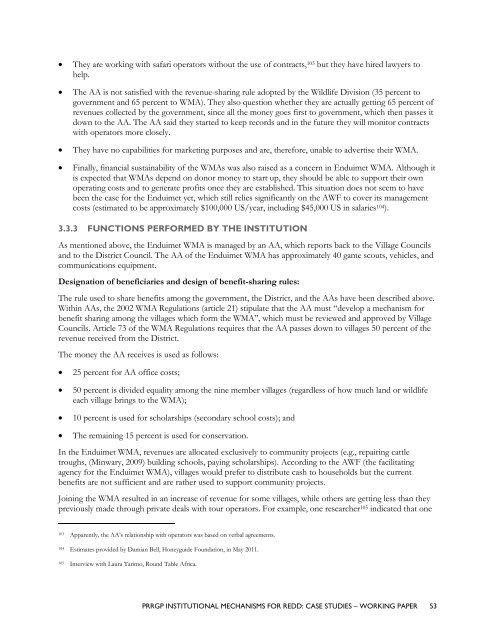Institutional Mechanisms for REDD+ - Case Studies Working Paper
Institutional Mechanisms for REDD+ - Case Studies Working Paper
Institutional Mechanisms for REDD+ - Case Studies Working Paper
Create successful ePaper yourself
Turn your PDF publications into a flip-book with our unique Google optimized e-Paper software.
� They are working with safari operators without the use of contracts, 103 but they have hired lawyers to<br />
help.<br />
� The AA is not satisfied with the revenue-sharing rule adopted by the Wildlife Division (35 percent to<br />
government and 65 percent to WMA). They also question whether they are actually getting 65 percent of<br />
revenues collected by the government, since all the money goes first to government, which then passes it<br />
down to the AA. The AA said they started to keep records and in the future they will monitor contracts<br />
with operators more closely.<br />
� They have no capabilities <strong>for</strong> marketing purposes and are, there<strong>for</strong>e, unable to advertise their WMA.<br />
� Finally, financial sustainability of the WMAs was also raised as a concern in Enduimet WMA. Although it<br />
is expected that WMAs depend on donor money to start up, they should be able to support their own<br />
operating costs and to generate profits once they are established. This situation does not seem to have<br />
been the case <strong>for</strong> the Enduimet yet, which still relies significantly on the AWF to cover its management<br />
costs (estimated to be approximately $100,000 US/year, including $45,000 US in salaries 104).<br />
3.3.3 FUNCTIONS PERFORMED BY THE INSTITUTION<br />
As mentioned above, the Enduimet WMA is managed by an AA, which reports back to the Village Councils<br />
and to the District Council. The AA of the Enduimet WMA has approximately 40 game scouts, vehicles, and<br />
communications equipment.<br />
Designation of beneficiaries and design of benefit-sharing rules:<br />
The rule used to share benefits among the government, the District, and the AAs have been described above.<br />
Within AAs, the 2002 WMA Regulations (article 21) stipulate that the AA must ―develop a mechanism <strong>for</strong><br />
benefit sharing among the villages which <strong>for</strong>m the WMA‖, which must be reviewed and approved by Village<br />
Councils. Article 73 of the WMA Regulations requires that the AA passes down to villages 50 percent of the<br />
revenue received from the District.<br />
The money the AA receives is used as follows:<br />
� 25 percent <strong>for</strong> AA office costs;<br />
� 50 percent is divided equality among the nine member villages (regardless of how much land or wildlife<br />
each village brings to the WMA);<br />
� 10 percent is used <strong>for</strong> scholarships (secondary school costs); and<br />
� The remaining 15 percent is used <strong>for</strong> conservation.<br />
In the Enduimet WMA, revenues are allocated exclusively to community projects (e.g., repairing cattle<br />
troughs, (Minwary, 2009) building schools, paying scholarships). According to the AWF (the facilitating<br />
agency <strong>for</strong> the Enduimet WMA), villages would prefer to distribute cash to households but the current<br />
benefits are not sufficient and are rather used to support community projects.<br />
Joining the WMA resulted in an increase of revenue <strong>for</strong> some villages, while others are getting less than they<br />
previously made through private deals with tour operators. For example, one researcher 105 indicated that one<br />
103 Apparently, the AA‘s relationship with operators was based on verbal agreements.<br />
104 Estimates provided by Damian Bell, Honeyguide Foundation, in May 2011.<br />
105 Interview with Laura Tarimo, Round Table Africa.<br />
PRRGP INSTITUTIONAL MECHANISMS FOR REDD: CASE STUDIES – WORKING PAPER 53

















